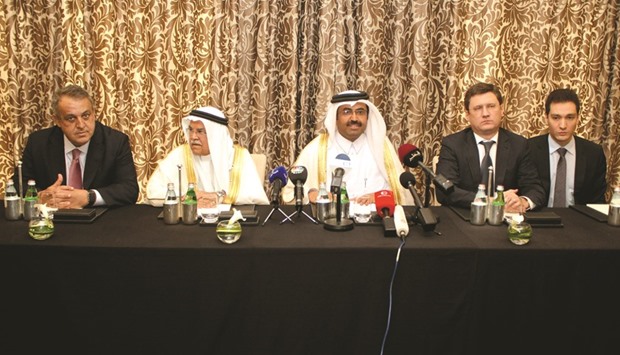Qatar has agreed with Saudi Arabia, Russia and Venezuela to freeze oil output production at January levels provided that other producing countries from Opec and out of it do the same.
The announcement was made at a joint press conference of HE the Minister of Energy and Industry and Opec president Dr Mohamed bin Saleh al-Sada, Saudi Minister of Petroleum and Mineral Resources Ali al-Naimi, Russian Energy Minister Alexander Novak and Venezuelan Oil Minister Eulogio Del Pino.
“This step is meant to stabilise the market,” al-Sada said, describing the meeting in Doha as “successful”.
He said the meeting reviewed the current situation of the oil market and the short- and long-term supply and demand. He said the trend of falling oil prices could not continue, highlighting the drop in oil investments while the demand for oil increased.
Al-Sada said talks would start with Opec members and non-member oil producing countries and also with Iran and Iraq in order to maintain market stability and achieve benefit for oil producing countries as well as global economy.
He added that he would lead talks in his capacity as Qatar’s minister of energy and industry and Opec president with support from the three ministers in order to reach an agreement with member states. “If these countries, including Iran and Iraq, agree to the proposal, it will be implemented.”
Describing the freeze as “the beginning of a process”, al-Naimi said the situation would be monitored in the next few months to “decide whether we need other steps to stabilise and approve the market”.
“We don’t want significant gyrations in prices. We don’t want a reduction in supply. We want to meet demand and we want a stable oil price,” al-Naimi said.
The Venezuelan minister said he would meet his Iraqi and Iranian counterparts to discuss the production freeze proposal.
The announcement followed a closed-door meeting of the four oil ministers in Doha.
“All four countries are ready to freeze oil production at January levels, if other major producers do the same,” said Russia’s energy minister.
Kuwait, Opec’s fourth largest producer, would freeze production at January levels, “conditional to the commitment of major producers from Opec and non-Opec members”, its acting oil minister Anas al-Saleh said.
However, energy-rich Azerbaijan refused to join the freeze.
The announcement of the freeze marked the first move between Opec and non-members to stem the price fall since the slide began nearly 19 months ago.
Iran said it would host talks with Iraq and Venezuela in Tehran today, and left the door open to joining efforts to stabilise the market.
“There’s room for discussion and examination of this issue,” Iranian Oil Minister Bijan Zanganeh said.
But he insisted that Iran intended to maintain its share of the market.
“What is important first of all is that right now the oil market faces an output surplus and, secondly, Iran won’t relinquish its share,” Zanganeh said.
Prices have come under renewed pressure by the return of Iran to world markets after the lifting of international sanctions linked to its nuclear programme.
Oil gave up early gains yesterday to trade lower despite the production freeze proposal.
In late London trading, benchmark Brent crude oil was down 64 cents to $32.75 a barrel, while the main US contract, WTI, was down 0.43 cents to $29.01. Business Page 2

HE the Minister of Energy and Industry and Opec president Dr Mohamed bin Saleh al-Sada (centre) with Russia’s Energy Minister Alexander Novak, Saudi Arabia’s Oil Minister Ali al-Naimi and Venezuela’s Oil Minister Eulogio Del Pino during a joint news conference following their meeting in Doha yesterday.
